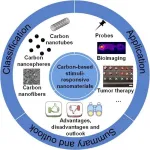(Press-News.org) More than three in five children (63 percent) enrolled in Medicaid do not receive mental health services within six months after a firearm injury, according to a new study published in the journal Pediatrics.
In the United States, 11,258 youth experienced nonfatal firearm injuries in 2020. Children who survive firearm injuries are at increased risk for adverse mental health outcomes, such as newly diagnosed trauma-related disorders, substance use and disruptive disorders. In addition to these disorders, the study found that after injury, the percentage of children diagnosed with bipolar disorder, schizophrenia spectrum disorders, and suicidal ideation/self-injury nearly doubled.
“In our study, we found that while too many children did not receive mental healthcare follow-up, children with a new mental health diagnosis identified during the firearm injury encounter had over twice the odds of timely connection to outpatient mental healthcare,” said lead author Jennifer Hoffmann, MD, MS, Emergency Medicine physician at Ann & Robert H. Lurie Children’s Hospital of Chicago and Assistant Professor of Pediatrics at Northwestern University Feinberg School of Medicine. “This shows that after a firearm injury, mental health screening and referral for youth at high risk are essential, as well as required by the 2022 American College of Surgeons standards for pediatric trauma centers. This best practice still needs wider implementation.”
The study also detected inequities in mental healthcare access after a firearm injury, with Black youth less likely to have any mental health follow-up than White youth.
“Mechanisms underlying these inequities may include stigma and costs related to accessing care, limited diversity in the mental health workforce, and shortages of mental health professionals in areas where Black children live,” said Dr. Hoffmann. “Attention is needed to address barriers at the individual, health system, and societal levels that may prevent Black youth from accessing mental health services.”
For the study, Dr. Hoffmann and colleagues examined Medicaid data of children aged 5-17 years with a nonfatal firearm injury, living in 11 geographically dispersed states from 2010-2018. They identified 2,613 children with firearm injuries. The objective was to analyze how timing of the first outpatient mental health visit after firearm injury varies by sociodemographic and clinical characteristics. They found that the first outpatient mental health visit after injury occurred sooner among children with prior mental health service use.
“For children without prior mental health service use, greater efforts are needed to connect them to mental health providers,” said Dr. Hoffmann. “To improve outcomes, it is important to prioritize early detection of mental health needs, equitable access to mental healthcare and timeliness of care.”
Dr. Hoffmann is the Children's Research Fund Junior Board Research Scholar.
Research at Ann & Robert H. Lurie Children’s Hospital of Chicago is conducted through Stanley Manne Children’s Research Institute. The Manne Research Institute is focused on improving child health, transforming pediatric medicine and ensuring healthier futures through the relentless pursuit of knowledge. Lurie Children’s is a nonprofit organization committed to providing access to exceptional care for every child. It is ranked as one of the nation’s top children’s hospitals by U.S. News & World Report. Lurie Children’s is the pediatric training ground for Northwestern University Feinberg School of Medicine. Emergency medicine-focused research at Lurie Children’s is conducted through the Grainger Research Program in Pediatric Emergency Medicine.
END
More than three in five children do not receive timely mental health services after firearm injury
More mental health screening and follow-up needed in youth after firearm injury
2023-06-05
ELSE PRESS RELEASES FROM THIS DATE:
Saving moths may be just as important as saving the bees
2023-06-05
Night-time pollinators such as moths need protecting as effectively as bees, as new research found they could be less resilient to the pressures of urbanisation
Moths account for a third of the pollinator visits to crops, flowers and trees in urban areas
More moths were found to be carrying pollen than previously thought, and visiting more types of plant and fruit crops than previously identified
Moth abundance has declined by 33 per cent in the last 50 years and this represents a threat to the plants and crops that rely on insects for pollination
Night-time pollinators such as moths may visit just as many ...
Deadly heart attacks more common on a Monday
2023-06-05
Serious heart attacks are more likely to happen at the start of the working week than at any other time, according to new research presented today at the British Cardiovascular Society (BCS) conference in Manchester.
Doctors at the Belfast Health and Social Care Trust and the Royal College of Surgeons in Ireland analysed data of 10,528 patients across the island of Ireland (7,112 in the Republic of Ireland, 3,416 in Northern Ireland) admitted to hospital between 2013 and 2018 with the most serious type of heart attack. This is known as an ST-segment elevation myocardial infarction (STEMI) and occurs when a major coronary artery is completely blocked.
The researchers ...
Testing for ‘zombie cells’ could boost number of hearts for transplant
2023-06-05
Testing older potential organ donors for dangerous ‘zombie’ cells could help to increase the number of hearts available for transplant, according to research part-funded by the British Heart Foundation (BHF) and presented at the British Cardiovascular Society conference in Manchester.
Currently, hearts from donors aged over 65 are not accepted for donation due to the likelihood of a poor clinical outcome. However, our hearts age at different rates and age isn’t necessarily the best indicator of heart health.
Researchers ...
Whales not to be counted on as ‘climate savers’: study
2023-06-04
Do whales increase the removal of carbon from the atmosphere?
Despite some hope that this would be the case, a new study led by Griffith University and a team of global researchers has found the amount of potential carbon capture by whales is too little to meaningfully alter the course of climate change.
Marine scientist Dr Olaf Meynecke and the team from the Griffith-led Whales and Climate Research Program including Professor Brendan Mackey and Dr Jasper De Bie, reviewed the primary ways in which baleen whales (such as humpback whales) removed atmospheric carbon ...
New drug delays progression of glioma, a deadly brain cancer
2023-06-04
Key takeaways
A targeted therapy drug called vorasidenib had positive results in delaying progression of a specific form glioma, a slow-growing but deadly brain cancer.
In a study of 331 people with the disease, the drug was effective in lengthening the period of time before the patients’ cancer worsened, and with no observed adverse effects.
New treatment approaches for glioma are needed because current treatments, including chemotherapy and radiation, can cause neurological deficits.
In ...
University of Sydney launches innovative research fellowship scheme to tackle global challenges
2023-06-04
An unprecedented investment by the University of Sydney, Australia will support up to 40 new continuing positions, empowering the world’s most talented emerging researchers to undertake innovative research to address some of the biggest challenges of our time.
A $100 million investment and a cornerstone of the University’s 2032 Strategy, the Sydney Horizon Fellowship scheme is the first of its kind in Australia and among the most generous university fellowships in the world.
“The Sydney ...
Real-world data suggests stopping immunotherapy after two years is reasonable in patients with advanced lung cancer
2023-06-04
CHICAGO – Over the past decade, the approval of immune checkpoint inhibitors has revolutionized treatment for patients with advanced lung cancer, helping many live longer lives and improving overall survival for the disease. However, an important question has remained unanswered: How long should a patient with advanced non-small cell lung cancer (NSCLC), who receives immunotherapy as part of their initial treatment, continue with treatment?
A new retrospective cohort study, published today in JAMA Oncology and presented at the 2023 American Society of Clinical Oncology (ASCO) Annual Meeting (Abstract ...
Association of immunotherapy duration with overall survival in advanced non–small cell lung cancer – this study is being released to coincide with a poster presentation at the 2023 ASCO annual meeting
2023-06-04
About The Study: The findings of this study provide reassurance that for patients with advanced non–small cell lung cancer whose disease is still responding to immune checkpoint inhibitor therapy at two years, stopping therapy and monitoring rather than continuing immunotherapy indefinitely is a reasonable strategy with sustained clinical benefit.
Authors: Lova Sun, M.D., M.S.C.E., of the Perelman School of Medicine at the University of Pennsylvania in Philadelphia, is the corresponding author.
To access the embargoed study: Visit our For The Media website at this link https://media.jamanetwork.com/
(doi:10.1001/jamaoncol.2023.1891)
Editor’s ...
The promise of novel FolRα-targeting antibody drug conjugate in recurrent epithelial ovarian cancer
2023-06-03
Presented today by VHIO’s Ana Oaknin at the 2023 ASCO Annual Meeting, 2-6 June (Chicago, IL), updated dose expansion data of the STRO-002-GM1 global phase I study* show promise of FolRα-targeting antibody drug conjugate (ADC) luveltamab tazevibulin in patients with recurrent FolRα-expressing epithelial ovarian cancer.
80% of patients included in this study presented with FolRα expression levels higher than 25%. The overall response rate among these patients was 43.8% in the dose expansion cohort, with a median duration of response ...
Carbon-based stimuli-responsive nanomaterials: classification and application
2023-06-03
Carbon-based stimuli-responsive nanomaterials are gaining much attention due to their versatility, including disease diagnosis and treatment. They work under endogenous (pH, temperature, enzyme, and redox) or exogenous (temperature, light, magnetic field, ultrasound) stimuli. Carbon-based stimuli-responsive nanomaterials can be used as smart materials with dynamically tunable physicochemical properties in response to changes in internal or external environmental stimuli. Their diverse combinations of nanostructures and molecular designs, as well as functional ...
LAST 30 PRESS RELEASES:
SfN announces Early Career Policy Ambassadors Class of 2026
Spiritual practices strongly associated with reduced risk for hazardous alcohol and drug use
Novel vaccine protects against C. diff disease and recurrence
An “electrical” circadian clock balances growth between shoots and roots
Largest study of rare skin cancer in Mexican patients shows its more complex than previously thought
Colonists dredged away Sydney’s natural oyster reefs. Now science knows how best to restore them.
Joint and independent associations of gestational diabetes and depression with childhood obesity
Spirituality and harmful or hazardous alcohol and other drug use
New plastic material could solve energy storage challenge, researchers report
Mapping protein production in brain cells yields new insights for brain disease
Exposing a hidden anchor for HIV replication
Can Europe be climate-neutral by 2050? New monitor tracks the pace of the energy transition
Major heart attack study reveals ‘survival paradox’: Frail men at higher risk of death than women despite better treatment
Medicare patients get different stroke care depending on plan, analysis reveals
Polyploidy-induced senescence may drive aging, tissue repair, and cancer risk
Study shows that treating patients with lifestyle medicine may help reduce clinician burnout
Experimental and numerical framework for acoustic streaming prediction in mid-air phased arrays
Ancestral motif enables broad DNA binding by NIN, a master regulator of rhizobial symbiosis
Macrophage immune cells need constant reminders to retain memories of prior infections
Ultra-endurance running may accelerate aging and breakdown of red blood cells
Ancient mind-body practice proven to lower blood pressure in clinical trial
SwRI to create advanced Product Lifecycle Management system for the Air Force
Natural selection operates on multiple levels, comprehensive review of scientific studies shows
Developing a national research program on liquid metals for fusion
AI-powered ECG could help guide lifelong heart monitoring for patients with repaired tetralogy of fallot
Global shark bites return to average in 2025, with a smaller proportion in the United States
Millions are unaware of heart risks that don’t start in the heart
What freezing plants in blocks of ice can tell us about the future of Svalbard’s plant communities
A new vascularized tissueoid-on-a-chip model for liver regeneration and transplant rejection
Augmented reality menus may help restaurants attract more customers, improve brand perceptions
[Press-News.org] More than three in five children do not receive timely mental health services after firearm injuryMore mental health screening and follow-up needed in youth after firearm injury



